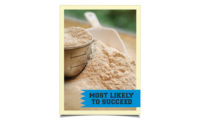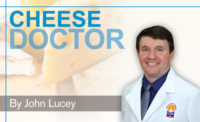Sticking to the Basics

Sticking to the Basics
by James Dudlicek
“The chapter we’re in now is, in some sense, rediscovering our roots,” says Gary Hirshberg, president and chief executive officer — CE-Yo, actually — of Stonyfield Farm, reflecting on the continued growth in organics, especially the dairy segment.
And consumers are proving they’re willing to pay
for that rediscovery. A new report by Mintel values the organic food market
at about $3.6 billion in 2006, more than double the market five years ago.
Londonderry, N.H.-based Stonyfield Farm currently has about $250 million of
that in its own sales (already up from the reported $211 million that
placed it at 53rd on Dairy Field’s 2006 Top 100 ranking of dairy processors last June),
versus about $83 million in 2001.
The company consistently posts double-digit growth in
one of dairy’s strongest segments — important to
Hirshberg’s ability to maintain control of the company as part of its
unique arrangement with French giant Groupe Danone, which owns 85 percent
of Stonyfield Farm.
With manufacturing operations on each coast (its home
base in the midst of a $61 million phase of improvements), a steady stream
of new products and new ventures under way overseas, driven by
Hirshberg’s vision and the global resources of Groupe Danone,
Stonyfield Farm is a bright spot in today’s dairy industry.
Extending savvy American-style dairy marketing ideas
abroad, Hirshberg and Groupe Danone chairman Franck Riboud launched
Stonyfield Europe in June with a 37 percent interest in Glenisk,
Ireland’s leading organic dairy processor. Three months later, this
venture begot Stonyfield France and its Les Deux Vaches des Fermiers du Bio
(“the two cows of organic farmers”) line of organic yogurts.
Admittedly, the venture across the pond is not assured
success. “You have, in Europe, the highest per capita consumers of
organics in the world, and you have the lowest,” Hirshberg explains.
“You have Austria, Germany, the U.K., increasingly Ireland, which
really value organic. Scandinavia. And then you have France, Spain and
Italy, which are saying, ‘Why do we need organic? We have the finest
foods in the world.’ And it’s hard to argue with their tastes.
But they just assume the food is pure because they celebrate the role of
the farmer. So in fact, it’s not a slam dunk even in Europe; it
depends very much on the country.”
At the Forefront
Back home, the rise in organics has come fast and
furious within the past few years — so much so that demand is far
outstripping the limited supply of organic milk. Hirshberg has even
investigated the possibility of importing organic milk powder from New
Zealand to supplement domestically available ingredients.
“We’re thrilled that there’s demand
for natural and organic products and the Stonyfield brand across all the
channels,” says Carter Elenz, Stonyfield’s senior vice
president of sales. “It wasn’t too long ago that we really had
to work hard to persuade customers there was a consumer need out there.
Today, though, across all channels — whether it’s natural food,
which is at our core; the grocery channel; the mass-merchandise channel;
the club channel; the foodservice channel — there’s an organic
demand in each of those now. We enjoy distribution in each of those
channels and have distribution coast to coast.”
Beyond what may be driving demand for organics,
what’s helping to drive demand for Stonyfield is a constant stream of
new products designed for consumers’ specific needs: active adults,
developing infants, anyone seeking a boost of fiber or other wellness
benefits.
“Our YoBaby line continues to be a great
success,” says Tim Kenny, vice president of marketing. “In the
last two years, we’ve introduced some new fruit and cereal SKUs. Last
year, it was fortified with iron, and this year our new introduction was
fortified with DHA [a fatty acid that aids brain development]. Another
successful line for us is the first light yogurt without an artificial
sweetener. Our fat-free line continues to be one of our fastest-growing
lines. It’s one of the few diet yogurts out there that doesn’t
use artificial sweeteners. The other unique difference our fat-free line
has — actually in our whole line — is inulin, a dietary fiber.
This year, we introduced two multi-packs to our fat-free line, and those
have done very well for us.
“On the Brown Cow side, we introduced four SKUs
of Fruit and Whole Grain. It’s a very unique product; whole grains
are very much a consumer interest area, with the government recommending we
take in more whole grains. They’re just off to a start right now, but
we’re really excited about their potential.”
Even with numerous successes, it must be a challenge
to keep up with the current demand for organic food products.
“There’s a lot of gut feel and common sense in any one of the
successes we’ve had in my 12 years here,” says Kasi Reddy,
senior vice president for research and development, quality assurance and
contract manufacturing. “YoBaby, smoothies — these were ideas
with no consumer testing.”
Stonyfield Farm’s short-term strategy is about
new products and line extensions, Reddy says. Long-term strategy focuses on
the future of the category: cultures.
“We rely on yogurt cultures for not only health
benefits, but for functional benefits such as building body and texture,
and the quality of design that we need in the absence of starches, gelatins
and other functional ingredients. It’s a critical part of our
research,” Reddy explains. “The other critical part would be in
probiotics, such as our exclusive culture for use in yogurt, yogurt drinks
and cultured soy. Another area would be prebiotics, such as the inulin that
we use in all of our products except frozen. We are the first company to
use a prebiotic, which multiplies the beneficial bacteria tenfold and also
helps boost calcium absorption and builds bone density.”
Always Educating
As the organic segment grows and new players emerge,
Stonyfield Farm enjoys a strong position with consumers that it has been
building for nearly 30 years. Still, the company knows better than to rest
on its reputation.
“To the customers, the first sell is to convince
them of the natural and organic need that’s out there. As I
mentioned, that was harder to do until recently,” Elenz says.
“Then it’s convincing them that Stonyfield Farm’s the
right brand. A lot of that sell is around all the product attributes that
we have in our items, in addition to the breadth of our line. Beyond that,
I think we work really hard to educate the customers. We have insights we
can bring that will help them grow their business in the right way. Lastly,
after selling on those fundamentals, we definitely sell to the customers
the whole mission of Stonyfield Farm, that in selling Stonyfield products
they’re helping do good for the Earth as well.”
The brand’s good standing with consumers has
helped of late, with marketing activities scaled back due to financial
considerations. But as a company known for guerilla marketing tactics like
passing out yogurt on train platforms as a thank-you to commuters for using
public transportation, Stonyfield is no stranger to finding new ways to
spread the word.
“We tend to go against targeted audiences like
the YoBaby audience, to pregnant women — that’s a key trigger
point to converting to organic,” Kenny says. “We’re in
some titles that are targeted to weight-watchers who really appreciate our
message of no artificial sweeteners and more fiber in the diet. We did some
PBS sponsorships this year. We do some traditional programs like FSI
couponing; then we do some more targeting couponing using the coupons you
get as you check out. We’ve used direct mail to reach some targeted
audiences like for YoBaby, parents of babies.”
Further, Stonyfield Farm participates in an
industry-wide program called Go Organic, an in-store program by an alliance
of several food manufacturers. “That really fits our mission of being
an educator and ties in with some of our other programs like our community
marketing program, where we have teams in seven different cities,”
Kenny says. “They go to various festivals and not only hand out
samples, but educate people about organics and about who we are as a
company.”
The company’s latest campaign, a traveling road
show called Mooville, features a flatulent mechanical cow that’s
become a kid-pleaser. “It’s about trying to educate people in a
much bigger way than we’ve been able to do in the past,” Kenny
says. “The cow ‘talks’ to the kids; there are signs on it
they can lift and learn about organic farming. It was a chance to really
educate people in a bigger way than we’ve ever done
before.”
Stonyfield Farm also leverages the Internet in a big
way, with an extensive, heavily trafficked Web site as well as a staff
blogger who authors two blogs for the company.
“With our consumers, who are very much
information seekers, it allows us to put a lot of information out there and
let the consumers pick and choose what information they’re
seeking,” Kenny says.
And if you’re looking for information on global
warming, sustainable farming or other environmental issues, chances are
you’ll eventually find what you seek on a Stonyfield Farm yogurt lid.
“We’ll call consumers’ attention to things that are
important to us,” Kenny explains. “If it’s a global
warming campaign, we’re encouraging people to go on a Web site and
sign up and say they support certain initiatives that might be in Congress.
We created a new Web site this year called RenewUS.org, which is
specifically to educate people about global warming and what actions they
can take to make a difference.”
Bringing the company back to its roots is its
financial support of an organic dairy farming program at the University of
New Hampshire. “It’s part of Stonyfield’s Profits for the
Planet program, where we donate 10 percent of our profits to various
initiatives that will help educate people, in this case about organic
farming and creating a new group of leaders for the future,” Kenny
says.
Nancy Hirshberg, vice president of natural resources
and Gary’s sister, explains further: “Organic dairy farmers
have been on their own. They’ve had no research support by
universities, and now for the first time, they will.”
Strong Commitment
Beyond building a brand and building new products is a
core belief in building a better world in the process. Stonyfield
Farm’s founding principles are instilled in all employees and
reinforced in the way the company nurtures its work force.
“It happens on a very grassroots level,”
says John LeBourveau, vice president of human resources. “We have a
number of committees that get the employees involved in efforts of the
business. When we talk about coming up with suggestions for making the
business stronger or more friendly, that spills over into areas such as
safety or quality.”
A suggestion box ensures employee input reaches the
highest executive levels and are shared with the team in the
company’s internal newspaper. “They’re usually very
insightful, and they do challenge the business in terms of its philosophy
about decisions or things that they see,” LeBourveau says.
Further, Stonyfield regularly holds
“all-staffs” — large employee meetings convened in
multiple shifts to accommodate the growing work force. “It’s
absolutely reinforcing for employees to come forward with their ideas, and
they do get a closer interaction with some of the executive members that
they might not normally see,” LeBourveau says.
Stonyfield Farm also encourages employees to donate
time to the community, offers the “Fit on the Farm” physical
fitness incentive program and plans to offer incentives to team members who
purchase more fuel-efficient cars like hybrids, further driving home the
company’s core beliefs.
Standing Apart
It’s not hard to see what sets Stonyfield Farm
apart from other companies, dairy or otherwise. But what do the folks
themselves who make it all work think makes their company unique?
Commitment to the environment, Nancy Hirshberg says.
“Healthy food has to come from a healthy planet,” she says.
“That’s organic, that’s our wastewater plant,
that’s everything that we do. And we do it in a very deep
way.”
Steve Inamorati, vice president of supply chain and
logistics, agrees: “It’s the way we walk our talk. There are
many companies that are just low-cost producers out there. We’re
clearly not, by being organic.”
It’s also putting environmental and social
responsibility “on an equal footing with long-term
profitability,” Kenny adds. “I think we’re finding a way
to make them both work. Other companies get into organic as an opportunity
— we’re in organic because it’s who we are. It’s
taking us a while to educate consumers on what those health benefits are,
but it’s an investment we’re making because we feel it is right
for us as a company.”
Rolf Carlson, vice president of purchasing, calls it
the authenticity of the brand. “Our product is a conduit from the
organic producers to the consumers,” he says. “To me, organic
is the starting point where we can start having a dialogue about healthy
food, protection of the environment, conservation of energy and sustainable
agriculture.”
Stonyfield Farm represents more than just doing a job,
says Diane Carhart, chief operating officer. “You feel you are
working for the greater good,” she says. “We have grown our
profitability tremendously as we’ve converted more products to
organic. We’ve not taken any steps back to increase profitability,
and to do that, you have to be innovative, smarter, thinking all the
time.”
Stonyfield Farm History
Started on a Wilton, N.H.,
farm in the early 1980s, Stonyfield Farm began as an organic farming school
committed to teaching sustainable agricultural practices. School founder
and chairman Samuel Kaymen was one of the country’s early authorities
on organic and bio-dynamic agriculture. Gary Hirshberg, current president
and “CE-Yo,” was an environmental activist, windmill-maker,
author and entrepreneur when he joined the fold.
At first, the farm sold yogurt only to fund its our
school, consisting of a few Jersey cows. Kaymen and Hirshberg milked the
cows, made the yogurt, made sales calls and even delivered the yogurt.
As business grew, the team realized a successful
yogurt company could serve sustainable agriculture and the environment
better than the school could. In 1988, the organization moved 30 miles east
to its current location in a custom-designed plant in Londonderry, N.H.,
just on the outskirts of Manchester.
Proclaiming to be the world’s leading organic
yogurt-maker, Stonyfield’s all-natural and organic yogurts,
smoothies, cultured soy, ice cream and milk are sold in supermarkets,
natural foods stores and colleges nationwide. And of course, efforts
continue to promote sustainable agriculture, and protect and restore the
environment.
Stonyfield’s mission is to provide the very
highest-quality, best-tasting, all-natural and certified organic products;
educate consumers and producers about the value of protecting the
environment, and of supporting family farmers and sustainable farming
methods; serve as a model that environmentally and socially responsible
businesses can also be profitable; provide a healthful, productive and enjoyable work place for
all employees, with opportunities to gain new skills and advance personal
career goals; and recognize our obligations to stockholders and lenders by
providing an excellent return on their investment.
2006 Processor of the Year
For helping drive demand
for organic dairy products as well as cultured dairy overall, developing
innovative new products, promoting the healthful and functional aspects of
dairy foods, and expanding U.S. dairy entrepreneurship to overseas markets,
Dairy Field has
selected Stonyfield Farm as its 2006 Processor of the Year.
Criteria for the honor include industry leadership,
business initiatives, marketing achievements, technological advances and
relations with employees, suppliers and the community.
The third top-selling yogurt brand in the United
States (right behind that of its majority owner), Stonyfield Farm is a
pioneer in two of the strongest growth segments in the dairy industry:
cultured products and organics. Its three-decade commitment to what it
regards as the purest form of yogurt and its role in health and wellness is
returning strong dividends as the industry feels the ripple effects.
Pushing the limits of yogurt’s functional
qualities, Stonyfield Farm has been at the forefront with its use of the
probiotic fiber inulin, its YoBaby line of yogurt products specifically
formulated for the needs of infants and toddlers, and its development of
smoothies to expand the appeal of yogurt through convenience and
portability.
Furthering its role as a standard-bearer of organic
dairy, Stonyfield Farm’s name can now be found on a line of organic
milk and ice cream products, available nationally along with its yogurts.
Acquisition of the Brown Cow yogurt brand has allowed Stonyfield to extend
its influence to the opposite coast from its New England home base.
Most recently, Stonyfield has further leveraged the
resources of majority owner Groupe Danone in bringing its business model
overseas. With a stake in Ireland’s leading organic dairy, the
company has launched Stonyfield Europe, and is already fielding a new crop
of products distinct from its U.S. counterparts but developed using the
same philosophies.
Beyond the dairy industry, Stonyfield Farm has become
well known for its commitment to environmental issues, nutritional
education and promotion of healthier foods in school vending.
DF will present its 2006
Processor of the Year Award to Stonyfield Farm at the 2007 Dairy Forum in
Orlando, Fla., in January.
Looking for a reprint of this article?
From high-res PDFs to custom plaques, order your copy today!







